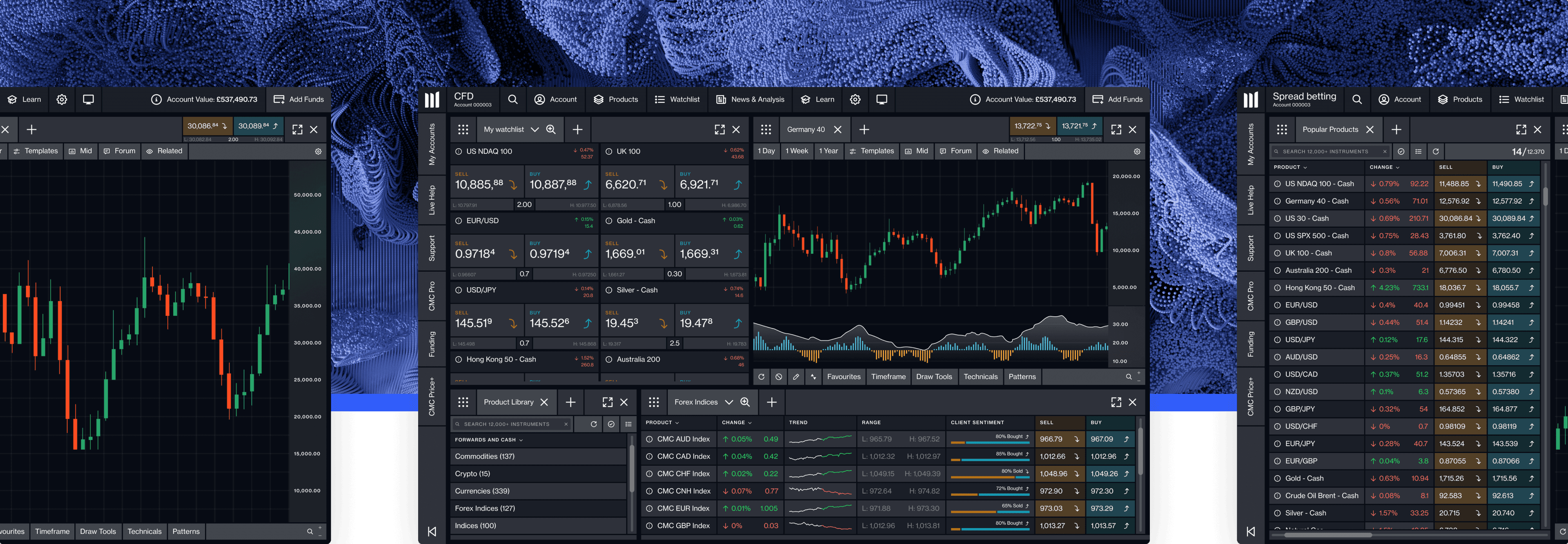
A guide to scalping forex
Forex scalping is a short-term trading strategy that attempts to make a profit out of small price movements within the forex market. Scalpers will buy and sell a foreign currency pair, only holding the position for a period of a few seconds or minutes. They then repeat this process throughout the day to gain frequent returns, by taking advantage of price fluctuations.
In the forex market, another name for the smallest price movement a currency can make is a pip (percentage in point), which traders use to measure profits and losses. Forex scalpers usually aim to scalp between 5-10 pips from each position, aiming to make a more significant profit by the end of the day. Forex scalping is a form of arbitrage trading.
This is considered to be one of the shortest-term strategies for trading
As it involves placing a high volume of trades in a short timeframe, not all brokers allow it, although it’s not illegal
Scalpers tend to look for currency pairs with tight spreads, low margin rates and a high trade volume
Some of the most popular markets to scalp include currency pairs and stocks
It can be a costly strategy as brokers will charge fees for entering positions frequently
What does scalping mean in forex?
Scalping in forex is a short-term trading strategy that aims to make profit out of tiny price movements. Many forex scalping strategies involve leveraged trading. Using leverage in forex is a technique that enables traders to borrow capital from a broker in order to gain more exposure to the forex market, only using a small percentage of the full asset value as a deposit.
This strategy magnifies profits but it can also magnify losses if the market does not move in a favourable direction to the bet. Therefore, forex scalpers are required to keep a constant eye on the market for any changes.
Forex price action scalping strategy
Price action trading is a technique that works without an indicator. Instead, forex scalpers analyse elements of technical analysis, focusing on price only. This is observed through candlestick charts, using support and resistance levels and trendlines to decipher the same information that they would extract from a technical indicator. By conducting an in-depth analysis of price, traders can then make an informed decision based on trend continuations and will only scalp a trade if the target has the appropriate risk-reward ratio.
Forex price action scalping ignores all elements of fundamental analysis in favour of a technical approach, and these types of traders do not take into account other external factors that could affect the price of a currency pair. For example, some key economic indicators that impact the price of foreign currencies include inflation, economic growth, supply and demand, trade status, interest rates and account balance.
How to scalp forex
Pick a derivative product to scalp with - We offer spread betting, which is tax-free in the UK*, and contracts for difference (CFDs).
Choose your forex pair - We have 300 currency pairs to choose from
Learn about our trading costs - Spreads and margin rates differ, based on whether it's a major, minor, or exotic FX pair.
Decide if you want to buy or sell - Determine your entry and exit points depending on whether you think the price will rise or fall.
Utilise risk-management tools - Stop-losses for example, are an important part of trading, especially when practising a forex scalping strategy.
Forex scalping signals
In volatile markets, trading signals are generated by software or technical indicators in order to identify entry and exit points for a trade. In particular, forex scalping signals are important, due to the speed of the trade. In the forex market, both long-term and short-term signal providers target a number of pips to help scalpers spot potential opportunities when the market is particularly volatile, or equally, when it is quiet and there is less liquidity. Forex scalping signals are based on economic events, such as the ones we have discussed above, or forex scalping indicators.
Most traders use a forex scalping system that allows them full exposure to graphs, pips and forex technical indicators with access to major city trading times across the globe. Technical analysts in particular study price charts to look for opportunities at the busiest times of the day, and are required to stay fully concentrated.
What are some indicators for forex scalping?
So, what is the best indicator for forex scalping? Below are some examples of popular indicators that we offer on our online trading platform. Forex scalping indicators such as Bollinger Bands, stochastic oscillators and Keltner channels work to demonstrate patterns and trends on price charts as they monitor the online forex market.
Bollinger Band scalping
A Bollinger Band chart is effective at showing the volatility of the forex market, which is useful for scalpers as their trades tend to be so rapid, usually within a maximum of 5 minutes for each position. Bollinger Band scalping is particularly effective forex scalping indicator for currency pairs with low spreads in the forex market, as these are the least volatile and if executed correctly, can gain the forex scalper multiple profits at once. These include a mix of major and minor currency pairs such as the EUR/USD, GBP/USD and EUR/JPY.
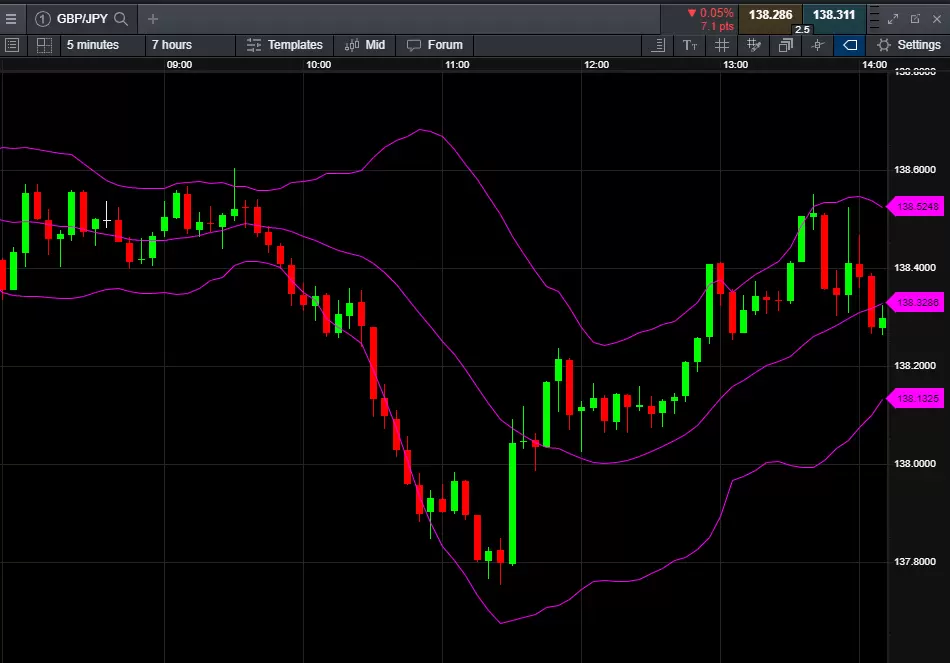
Moving averages for scalping forex
There are multiple moving average lines on a typical forex graph. Some of the most commonly used forex indicators for scalping are the simple moving average (SMA) and the exponential moving average (EMA). These can be used to represent short-term variance in price trends of a currency. A moving average graph is one of the most frequently used forex scalping indicators by professionals through its ability to spot changes more rapidly than others.
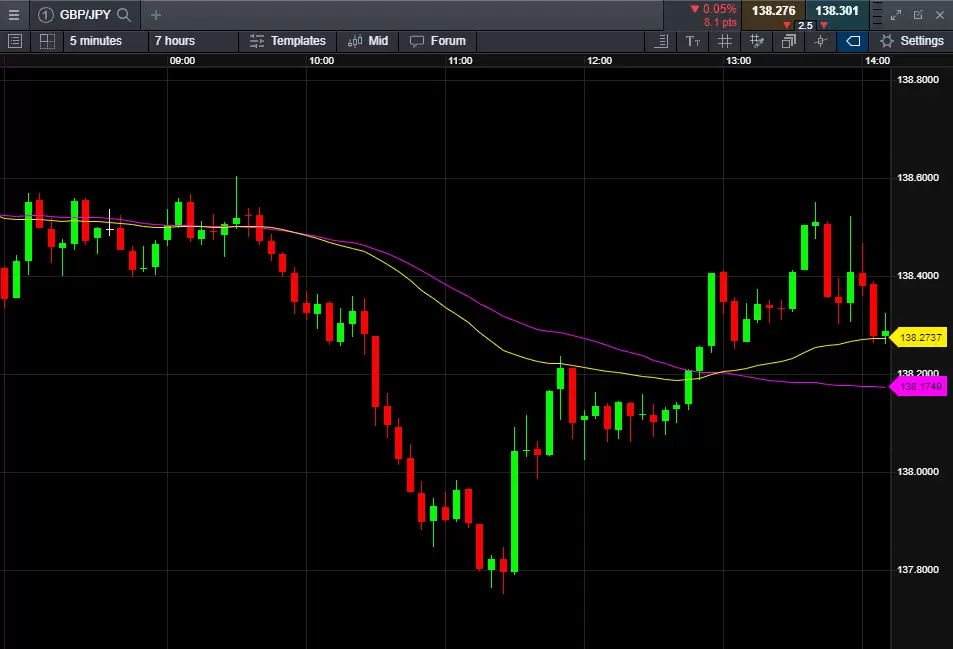
Forex RSI scalping
The relative strength index (RSI) is a momentum oscillator that predicts the future direction of the forex market over a period of time. Short-term traders, such as day traders and scalpers, can shorten the default settings of the RSI to monitor just minutes at a time, in order to find the best entry and exit points. Measuring momentum is useful within the forex market for traders to find a suitable strategy for the current environment.
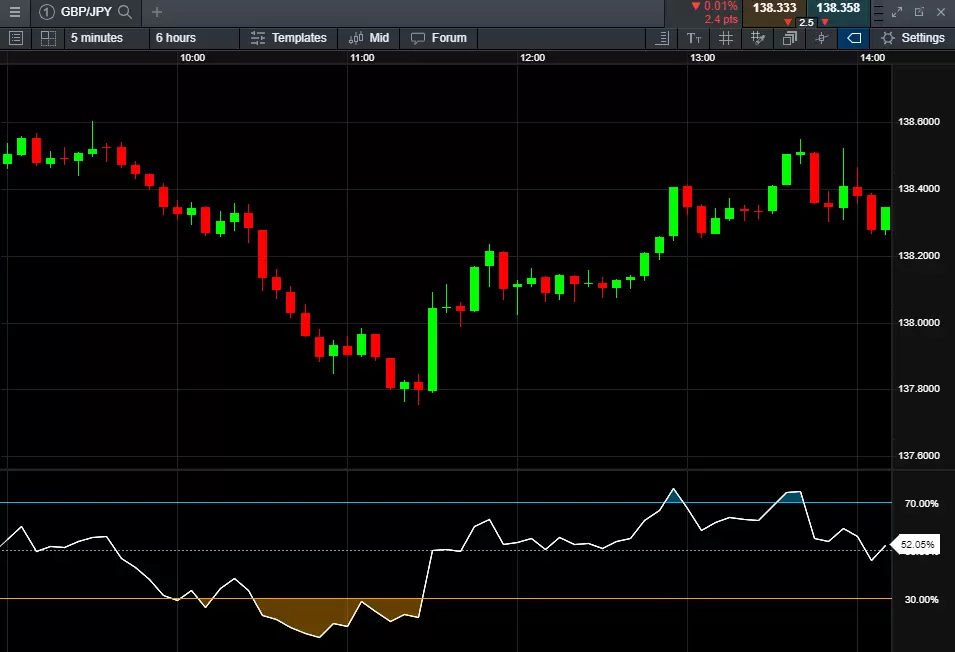
Forex scalping tips
Some traders prefer to only trade currency pairs where both liquidity and volume are highest. Scalping is very fast-paced and therefore major currency pairs need liquidity to enable the trader to dip in and out of the market at high speed.
Scalpers often have a specific temperament or personality that reflects the risky method of trading. Scalping requires concentration, analytical skills and a decent amount of patience, allowing scalpers to make hasty decisions with the hope of making a profit.
Is there a best pair for forex scalping?
Although there is no 'best currency pair' for scalping, some popular choices include major currency pairs such as the EUR/USD, GBP/USD and AUD/USD, as well as minor currency pairs including the AUD/GBP. This is because traders will be dipping in and out of the market very frequently and these currencies have the highest trade volumes and the tightest spreads to minimise losses. The tighter the spread, the fewer the number of pips the rate has to move before your trade is in profit.
However, some more experienced traders may prefer to scalp minor or exotic pairs, which generally have higher volatility than the major currency pairs but carry greater risks.
What time can you scalp in the forex market?
There is a general consensus between traders for the best times to scalp forex, although this does depend on the currency. For example, trading a currency pair based on the GBP tends to be most successful throughout the first hour of the London trading session, mid-morning. However, the best time to trade any major currency pairs is generally throughout the first few hours of the New York trading session, as the USD has the highest trading volume.
It goes without saying that traders do not monitor charts outside of forex trading hours. Some scalpers also prefer to trade in the early hours of the morning when the market is most volatile, though this technique is advised for professional investors only, rather than amateurs, as the risks could create greater consequences.
Is forex scalping profitable?
The forex market can be volatile and instead of showing small price fluctuations, it can occasionally collapse or change direction entirely. This requires the scalper to think with immediate effect on how to ensure that the position does not incur too many losses, and that the subsequent trades make up for any losses with greater profits.
Other risks of scalping include entering and exiting the trade too late. Volatile price movements between currency pairs are frequent and if the market starts going against your open position, it can be difficult to close the trade quickly enough before losing capital.
The use of a high amount of leverage is also very risky. Forex margins can help to boost profits if scalpers are successful, however, they can also magnify losses if the trades are poorly executed.
The advantage of a scalper’s concentration and personality means that they should be able to spot these changes straight away and close their position in order to avoid losses. The longer the position is held for, the more risk of prices moving outside the scalper’s betting range. Therefore, the majority of scalpers usually stick with the tighter currency spreads and not make too many bold choices in order to minimise risk.
A scalping strategy is not advised for beginner traders, due to the level of experience, concentration and knowledge required of the forex market. There is a much higher likelihood of failing positions than of winning positions in these circumstances. Often, more experienced or institutional traders use strategies such as a scalping, arbitrage or high-frequency trading (HFT) to carry out quick transactions.
Putting into place stop-loss orders when currency trading in such volatile conditions can help a trader more effectively manage their risk and losses. When it comes to scalping, this allows traders to set a specific price at which their positions will close out automatically if the market goes in the opposite direction. Given that a scalp trade only lasts a few minutes at most, this prevents the trader from holding onto a sinking position.
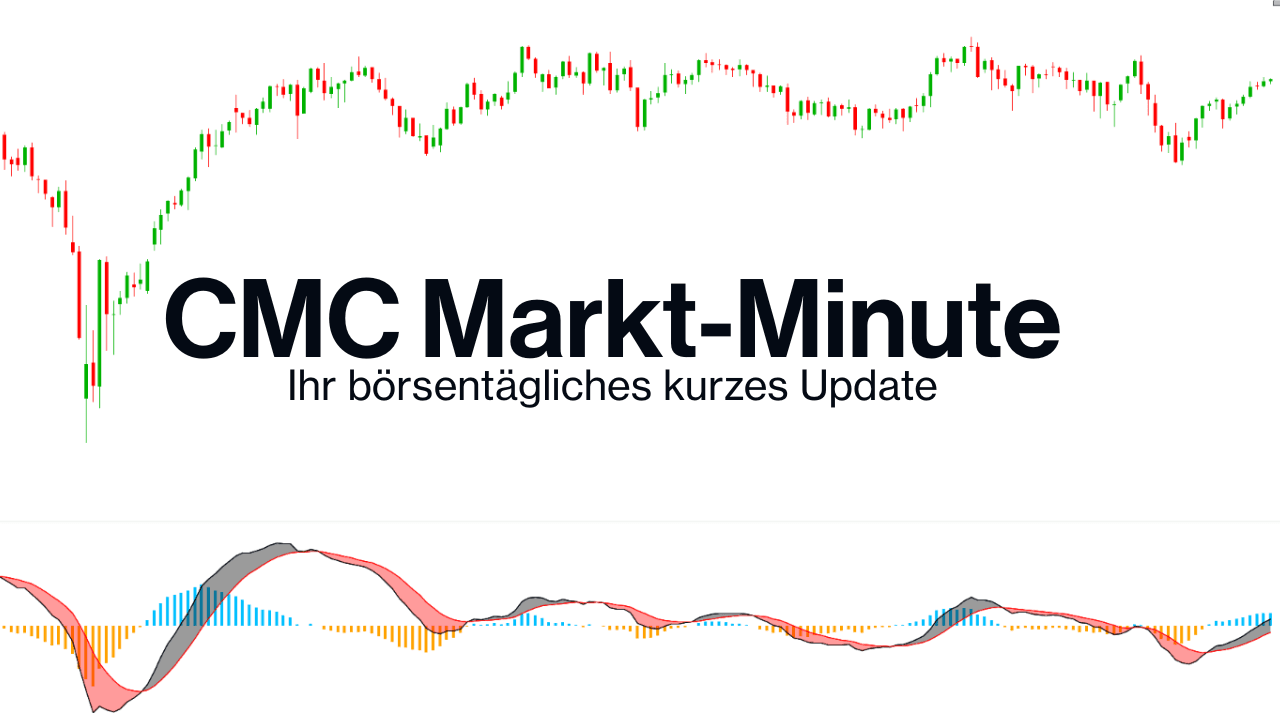
Forex scalping software
Currency trading is available on our online trading platform, Next Generation. Our award-winning platform comes with a range of forex scalping indicators, as well as drawing tools for trendlines, support and resistance levels and customisable candlesticks, so that your data is displayed as clearly as possible. This works for executing faster trades with ease.
Most of our traders analyse the market on a regular basis for upcoming events that may have an effect on their spread. Our economic calendar provides data on the latest economic events, announcements and changes that may have an impact on the forex market, so that our clients are always one step ahead of the trade.
What about a forex scalping forum?
With a live account, our traders have access to our online chart forums. These are updated regularly with market news and analysis from professional traders of the platform, so you can share ideas and take influence from others' success with forex scalping strategies. Read more about our trading forum here.
What is automated forex scalping?
Some platforms offer the opportunity for algorithmic trading that is very popular among forex scalpers, due to the rapid speed of trades. Automated trading means that the software will work autonomously to identify forex scalping signals, enter and exit a trade swiftly, all while keeping an eye on the price movements of your chosen currency pair. Our international hosted platform, MetaTrader 4, offers automated trading for forex traders. Learn more about MT4 or register for an account.
*Tax treatment depends on individual circumstances and can change or may differ in a jurisdiction other than the UK.
Forex scalpers tend to use a short-term timeframe, which is usually only a matter of seconds or minutes. This allows them to identify quick entry and exit points to take advantage of volatility within the forex market. Find an appropriate chart timeframe for your chosen instrument with our detailed guide.
Pips are used to measure the smallest currency price movements within the forex market. When scalping in forex, a trader can calculate the distance in pips they are willing to move as a risk measure. Learn more about pips (percentages in point).
Forex scalping can result in a series of small but frequent profits for experienced traders employing this strategy. However, trading on margin with leverage magnifies profits and losses based on the trade’s full value, therefore we recommend that you read our guide on forex trading explained, and how it works.
Spread betting and CFD traders trade with leverage when using a scalping strategy in the forex market. Leverage enables you to borrow capital in order to gain greater exposure on a trade, by depositing a percentage of the full trade value, based on an instrument’s margin rate. Forex margin rates start from 3.3%. Remember that trading using leverage magnifies profits and losses. Learn more about the risks of trading forex with leverage.
The best technical indicator for forex scalping depends on factors like market stability, how long you intend to hold your trade and the currency pair you’re scalping. Check our list of technical indicators to gain further knowledge of how each individual tool could benefit your forex scalping strategy.
Disclaimer: CMC Markets is an execution-only service provider. The material (whether or not it states any opinions) is for general information purposes only, and does not take into account your personal circumstances or objectives. Nothing in this material is (or should be considered to be) financial, investment or other advice on which reliance should be placed. No opinion given in the material constitutes a recommendation by CMC Markets or the author that any particular investment, security, transaction or investment strategy is suitable for any specific person. The material has not been prepared in accordance with legal requirements designed to promote the independence of investment research. Although we are not specifically prevented from dealing before providing this material, we do not seek to take advantage of the material prior to its dissemination.
